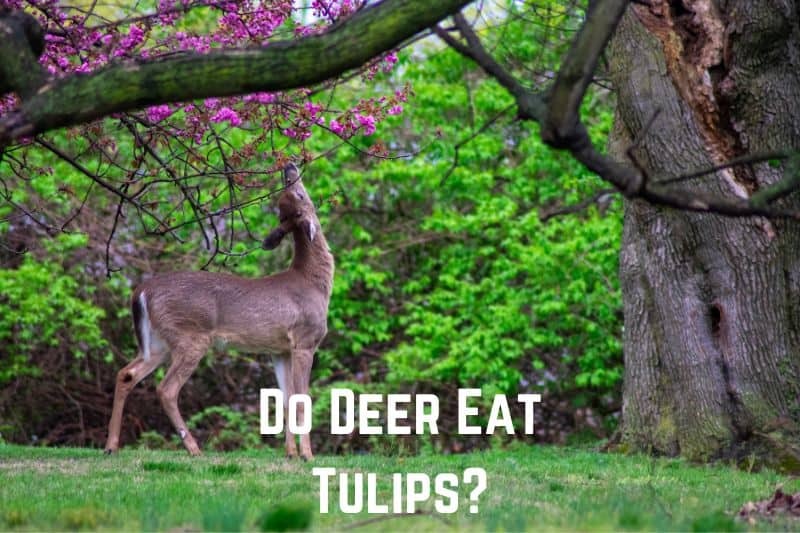Deer are opportunistic feeders who will eat any type of plant if they’re struggling to find food. But there are some plants that deer prefer over others. If you’re growing tulips in your garden, you might wonder if they’re at risk of deer eating or destroying them. Do deer eat tulips?
Deer are known to eat tulips, as well as other flowering plants. Flowers that bloom earlier in the spring are especially attractive to deer who will be hungry after a winter with limited resources, and there are tulip varieties that flower early in the spring.
Read: Do Deer Eat Zinnias? (No. They Won’t)
Are Tulips Deer Resistant?
Tulips are not completely deer-resistant because all varieties taste sweet to deer, almost like candy. Like other wild animals, deer will feed on various parts of the tulip plants as they are a tasty snack and easy to reach, especially if they are planted in an area where deer are present.
Although some tulip varieties bloom early in the spring, which is more attractive to deer than late bloomers, all tulips are at risk of being eaten by deer. According to research by The Wildlife Society, when deer were put in a position to choose between different spring flowers, tulips were the most popular they wanted to eat.
Do Deer Eat Tulip Flowers?
Deer eat tulip flowers, as these taste good to them. They will seek out the colorful tulip flowers instead of other flowers in the garden. The most common sign of deer eating tulip flowers is if your plants have missing flowers.
- Deer will eat tulip buds even before they can flower, so missing buds on your plants is another sign that deer are eating them.
- Deer will especially attack flowers and buds on tulip plants during the spring when they are starting to grow. This prevents the tulips from being able to sprout blooms, which is unfortunate.
- Along with flowers, deer will also eat the leaves of tulip plants. New growth is soft and moist, and therefore more appealing to them.
Some tulip varieties bloom early in the season, such as miniature tulips. Others bloom during the middle of the season or later. Knowing when your tulip variety will bloom is essential, as you’ll be better informed to protect your flowers from deer at the right time in the season.

Will Tulips Come Back After Deer Eat Them?
If deer have been snacking on your tulips at night, your plants will display signs such as:
- Stems that are cut in a rough or ragged way. Deer will bite through the stem and try to pull it off the plant, leaving behind a mess.
- Flower buds and flowers are missing from the plant.
- Leaves are missing on the plant, or they’re not whole.
Tulips can come back after deer have eaten them, but it depends on how much damage has been done to the plants. If all the flowers have been removed from the plant, they won’t bloom. However, as long as there are leaves on the plant, it can recover.
Other tips to bring tulips back after deer eat them:
- Give your plant some time to heal and grow.
- Keep the plant healthy by applying a water-soluble fertilizer to the soil to give your plant nutrients.
- If the stems of your tulip plant look disfigured, prune the plant so that only healthy growth remains. From there, the plant will be able to transport nutrients from the soil to healthy parts of the plant.
- When pruning your tulips, make clean cuts with sharp pruners. These cuts will heal better than the ragged, scraggly wounds made by wildlife.
Are There Deer-Resistant Tulip Varieties?
There are some deer-resistant tulip varieties. These are great to grow in your garden if you’re sick and tired of deer destroying your pretty flowers. If you’ve noticed that deer attack tulips that bloom early, you should try switching to other varieties. But, of course, that might not be enough to deter deer.
Some deer-resistant tulip varieties include:
- Darwin Hybrid Tulips. These tulips have large flowers and strong stems. Their stems are a bit stronger than those of other varieties, which makes it more challenging for deer to rip them off the plant.
- Wildflower Tulips. These are smaller tulips but have large flowers in many bright colors. Their size makes them a bit easier to display in the garden while protecting them from deer and other wildlife.
However, these tulip varieties aren’t completely deer-resistant. They have more barriers in place to deter deer, but keeping deer away isn’t guaranteed.
Alternative Plants to Tulips
- Daffodils. These are deer-resistant plants that add beautiful color to your garden. These flowers bloom throughout the spring season. Daffodils contain a chemical called alkaloid called lycorine, which is poisonous to deer and other wildlife.
- Hyacinths. Their strong fragrance smells good to people but is unappealing to deer. Hyacinths have thick clusters of flowers that keep wildlife out of your garden while looking beautiful.
- Snowdrops. These early bloomers are part of the amaryllis plant family. They appear late in winter, with flowers that hang low on the plant. Snowdrops are toxic to deer, so they’re 100% deer-proof.
- Allium. As a member of the onion family, allium flowering plants have a strong odor, which is unpleasant for deer. However, they look beautiful in the garden, with flowers that can be purple, pink, white, yellow, or red.
- Crown imperial. This unusual lily plant has a colorful flower on top of its stem that’s topped with a crown of pointy leaves. These plants have a strong, offensive odor to wildlife, so they’re great for use as a protective barrier to protect your tulips from deer. Their pointy leaves are also difficult for wildlife to eat.
- Osmanthus. This plant, which is part of the Oleaceae family, grows small white flowers, but it has a sweet smell that’s off-putting to deer. It’s also covered in spiny leaves that make it unappealing for deer to eat.
- Lantana. As part of the verbena family, this perennial has flowers with a strong scent and a generally rough texture, keeping deer away.
Read: Do Deer Eat Pansies? (Yes. They Do)

How To Protect Your Tulips From Deer?
You can protect your tulips from deer in the following effective ways:
- Install a fence around your tulips. This fence should be at least eight feet (2.4m) in height so that deer won’t be able to jump over them.
- Plant your tulips deeper. You should plant tulips at least three times the height of their bulb. Cover them with soil. By planting them deeper, this makes it more challenging for deer to pull them out of the ground.
- Plant daffodils and other plants that deer don’t find tasty or appealing. Herbs such as mint and lavender also repel deer, so planting these close to your tulips can help to protect them.
- Plant lavender around your tulips. Lavender rubs off on deer’s legs, which makes them dislike walking through it. By creating a wall of lavender to protect your tulips, you can ensure deer don’t get to them.
- Keep your tulips closer to your doors or windows. Deer are skittish animals who are afraid of people and will want to avoid getting too close to your house.
- Install bright lights and noisy items in the garden. Deer can be easily frightened, so it helps to install wind chimes and motion detector lights or keep your dogs in your garden to chase away deer.
- Plant spiky plants around your tulips. Deer want to eat soft and tender plants, so they won’t be drawn to plants that have prickly or rough leaves.
- Make use of hedges. Thick, dense hedges, such as boxwoods, look beautiful while blocking out deer. You can keep them around your flower garden or beds to create a natural barrier.
- Be mindful of where you place your plants. Less desirable plants should be planted in areas where deer will frequent. By comparison, plants that deer like to eat should be placed in high-traffic areas so that deer will be frightened to venture into them.
Following the above tips to deter deer from your garden is the best way to protect your tulips. Even if you choose a more deer-resistant tulip variety, there’s no such thing as a completely resistant tulip.
FAQs
Do deer repellants work?
Deer repellent products contain scents that deer don’t like, but they have to be reapplied in your garden to remain effective. You should apply them when you can see new plant growth, as this is most appealing to deer.
What scent scares deer away?
Strong scents are off-putting to deer and can help to keep them out of your garden. Strong herbs such as mint, rosemary, and lavender work particularly well to keep deer out of your garden.
Should you feed deer in your garden?
It’s not a good idea to feed deer in your garden. This will encourage them to return to your garden, and they’ll feed on plants the next time they arrive. Feeding starving deer in winter can be harmful to them because the high-energy food is too much for their systems to handle.






